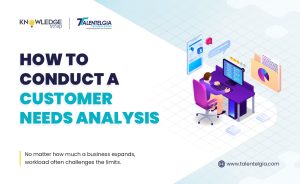Software engineering is currently experiencing a transformative revolution due to the rapid advancements in Artificial Intelligence (AI) technology. The utilization of AI-powered tools and techniques is revolutionizing various aspects of the software development process. These advancements encompass requirements analysis, code generation, software testing, and predictive maintenance.
As the future of software engineering unfolds, organizations seeking customized software solutions will increasingly rely on custom software development services.
This blog post delves into the profound impact of AI on software engineering and paints a vision of the future in a world dominated by AI.
AI-Driven Requirements Analysis and Design
In the realm of software development, requirements analysis and design have traditionally been labor-intensive tasks that consume considerable time. However, the latest developments in AI is fundamentally reshaping these stages, enabling significant progress. AI-powered tools have the capacity to analyze vast volumes of data, extract invaluable insights from user feedback, and generate comprehensive requirements specifications as well as system designs.
Through the utilization of AI, software developers can streamline the process of requirements gathering and design, thereby resulting in the creation of more precise and efficient software solutions.
Read also – A List of Reasons Why Going for Software Will Be in Your Favour!
Automated Code Generation Empowered by AI
Another transformative aspect of the latest developments in AI software engineering lies in the automation of code generation. AI algorithms possess the capability to analyze existing code repositories, discern patterns, and generate optimized code snippets that adhere to coding standards, best practices, and specific programming languages.
By harnessing the power of AI, software engineering teams can significantly enhance productivity and deliver software solutions of superior quality.
AI-Augmented Software Testing

Software testing plays a pivotal role in ensuring the reliability and functionality of software applications. AI-powered testing tools are revolutionizing this domain by leveraging advanced algorithms to analyze extensive amounts of code and test data.
These tools excel in defect detection, automatic generation of test cases, simulation of complex scenarios, identification of edge cases, and the efficient execution of regression testing, surpassing the capabilities of manual testing. By integrating AI with traditional testing approaches, developers can achieve faster and more dependable software testing, ultimately leading to the delivery of software products of higher quality.
AI for Predictive Maintenance of Software Systems
The practice of predictive maintenance holds immense significance in ensuring the long-term reliability and availability of software systems. AI algorithms play a pivotal role in this arena by continuously monitoring software systems, analyzing real-time data, and detecting anomalies or performance degradation.
By leveraging predictive maintenance algorithms, potential issues can be identified before they manifest, enabling proactive maintenance and minimizing system downtime. This approach contributes to the overall improvement in the reliability of software systems and enhances the efficiency of maintenance processes.
Read also – What not to do when working on software solutions?
The Future of Software Engineering Roles in an AI-Dominated World
As AI continues to reshape the software development process, the roles of software engineers and developers will evolve accordingly. While AI automates certain tasks, it is highly unlikely to completely replace software engineers. Rather, AI serves as a valuable tool that complements and enhances the skills of software engineers.
They will leverage AI-powered tools and techniques to boost their productivity and creativity. The collaboration between software engineers and AI systems will foster the development of innovative software solutions that meet the evolving needs of users and businesses.
In an AI-dominated world, software engineers will embrace new responsibilities that involve guiding and training AI systems, ensuring the ethical and responsible utilization of AI technology, and harnessing AI capabilities to create value-added software applications. Working hand inhand with AI algorithms, they will ensure the delivery of secure, efficient, and business-aligned software solutions.
Custom Software Development Services and the Future of Software Engineering
These services, exemplified by companies like Talentelgia, possess expertise in leveraging AI and emerging technologies, playing a crucial role in helping businesses navigate the ever-evolving landscape of software development.
With their experienced teams of professionals, custom software development services providers can assist organizations in harnessing the power of AI and delivering software solutions that cater to their unique and specific requirements.
FAQs
Q: What does the future hold for software engineering with AI?
The future of software engineering with AI is promising. AI-powered technologies are revolutionizing the software development process, enhancing efficiency, and enabling the creation of innovative software solutions. With the integration of AI, software engineers can automate routine tasks, leverage intelligent tools for code generation and testing, and make data-driven decisions for software design and maintenance.
The incorporation of AI into software engineering will result in faster development cycles, improved software quality, and enhanced user experiences.
Q: Will AI replace software engineers in the future?
While AI is transforming the software engineering landscape, it is highly unlikely to entirely replace software engineers. Instead, AI complements and enhances the skills of software engineers.
Software engineers will continue to play a vital role in guiding and training AI systems, ensuring the ethical and responsible use of AI, and leveraging AI capabilities to create innovative software solutions.
Q: Will AI take over the job of a software engineer?
No, AI will not take over the job of a software engineer. Instead, it will redefine the role of software engineers. AI technology empowers software engineers to become more efficient and productive by automating certain tasks and providing intelligent tools for code generation, testing, and maintenance. With AI, software engineers can concentrate on complex problem-solving, architectural decisions, and user experience design.
The collaboration between software engineers and AI systems will result in the development of advanced and innovative software solutions, ensuring that the role of software engineers remains essential in the future.
Q: What impact will AI have on software testing and maintenance?
AI has a significant impact on software testing and maintenance. AI-powered testing tools can analyze vast amounts of code and test data, detect defects, and automatically generate test cases. These tools excel at simulating complex scenarios, identifying edge cases, and performing regression testing more efficiently than manual testing. AI algorithms continuously learn from test results, refining their testing strategies over time.
This iterative approach enhances the effectiveness and efficiency of software testing, resulting in software products of higher quality. In terms of maintenance, AI algorithms can predict potential issues, allowing for proactive maintenance and minimizing system downtime. AI can also analyze user behavior and usage patterns to anticipate future needs and optimize software performance, ultimately improving the overall reliability and efficiency of software systems.
Q: How will the roles of software engineers change in an AI-dominated world?
In an AI-dominated world, the roles of software engineers will undergo transformation. They will leverage AI-powered tools and techniques to enhance their productivity and creativity. Software engineers will collaborate with AI systems to develop innovative software solutions that meet the evolving needs of users and businesses.
Their role will shift from solely writing code to becoming strategic thinkers and domain experts. They will guide and train AI systems, ensuring the ethical and responsible use of AI technology, and leveraging AI capabilities to create value-added software applications.
Conclusion
In conclusion, the profound impact of AI on software engineering is transforming the way software is developed, tested, and maintained. AI-driven requirements analysis and design streamline the process, while automated code generation empowers developers to focus on higher-level tasks. AI-augmented testing enhances software quality, and predictive maintenance algorithms minimize system downtime. In an AI-dominated world, software engineers will collaborate with AI systems, taking on new responsibilities and delivering innovative software solutions.
Custom software development services play a crucial role in harnessing AI’s power for tailored solutions. The future of software engineering with AI is promising, as it improves efficiency, software quality, and user experiences. Embracing AI technology enables software engineers to thrive and create value-added software applications for businesses and users alike.







